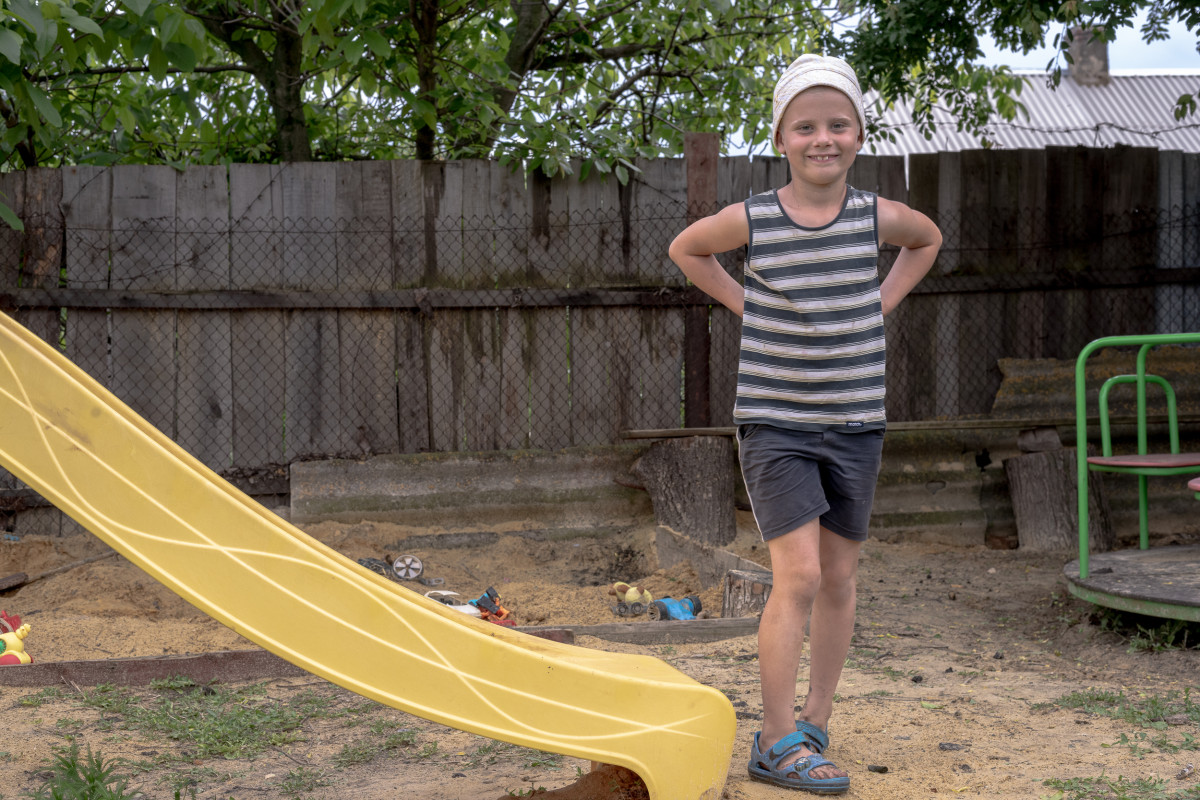A lifetime in the conflict zone for seven-year-old Kostia from eastern Ukraine
Published: Oct 5, 2021 Reading time: 4 minutes Share: Share an articleSeven-year-old Kostia has only known conflict. Born in Slavne, in the Donestsk region of eastern Ukraine, Kostia has grown up on the frontlines of Europe’s forgotten war.

He lives together with his sister Polina, four, and their parents. This year, like children all over the world, Kostia started school. But the realities of education in frontline eastern Ukraine are different due to many reasons starting from issues with transportation, lack of schools and many others. There is no school or kindergarten in Slavne, so Kostia’s parents have to take him and his sister to a neighbouring village.
Because there is no public transport, they have to drive the children by car. It’s expensive and time-consuming.
“Every day except weekends we spend more than an hour taking our children to school and kindergarten. And fuel is expensive too. But we don’t have any alternative,” says Nastia, Kostia’s mother. “We started thinking about moving to the neighbouring village. We even started looking for a house there. But it’s difficult to sell our house and buy a new one in another village. Who would buy a house in Slavne, right on the frontline? Besides, our children have friends here in Slavne,” she adds.
Kostia loves going to school. He has found new friends and already has a favourite subject. “I like my school very much and my favourite lesson is computer science,” he says. “But my dream is to be an archaeologist, because I want to find dinosaur bones. I love dinosaurs.”
Neither of the children has ever seen life in peacetime. They were born during the conflict and have survived the horrors of shelling and active fighting. The conflict in eastern Ukraine not only threatens their physical health, it also poses a grave risk to their mental wellbeing. The family spent many nights in the basement hiding from shelling when the fighting was heavy. Those events have affected the psycho-emotional wellbeing of the children as well as their parents.
For Nastia, remembering the birth of her son Kostia in 2014, the year the conflict started in east Ukraine, is emotional. She had a difficult pregnancy and gave birth in Donetsk, the regional capital, as she and the baby needed special care.
“I was so worried about my baby. He was so small because of complications with the pregnancy. The doctors wouldn’t promise that he would be alright,” she says. “But immediately I saw him, I realized he was a small copy of my husband, he looked so like him, and I was sure that everything would be fine despite all the problems we faced.”
Nastia returned from hospital to an active war zone in Slavne. Fighting was heavy, but the family had nowhere else to go.
“The shells were flying right overhead,” says Nastia. “It was terrible, we were so scared. But at home we knew where to go in case of shelling, and what to do. My husband went into the basement, checked if everything was okay there, and brought us down.”
Now there is less active fighting in the area. But the residents of Slavne still regularly hear the sound of shelling, and don’t feel safe in their home.
To support the residents of Slavne, including Kostia and Polina’s family, Mikhail, an experienced psychologist from People in Need (PIN), regularly visits the village and provides group and individual counselling for adults and children.
“Psychological help was very much needed for me and my children. It helped me to calm down and change my attitude towards the situation, as well as improve my relationship with my husband,” says Nastia. “The children are happy when Mikhail comes. They enjoy the different activities and sessions, and I see the positive effect.”
“Kostia is a child of war – he is exactly the same age,” says Mikhail, PIN psychologist. “Working with such children has its own issues. But in general, they are ordinary children who want to have friends, play, develop and communicate. Kostia also needed communication, support and self-realization. My job was simply to help him open up, support him through his first failures, and help him to believe in himself. Since Kostia lives in a zone of fairly frequent shelling and hostilities, the psychologist’s work is complicated by internal tension and a certain insularity . I am pleased that I was able to establish contact with the child, support him and help him prepare for school and adapt to a new social environment.”
The residents of frontline villages in east Ukraine receive psycho-social assistance with generous support from the European Union.
